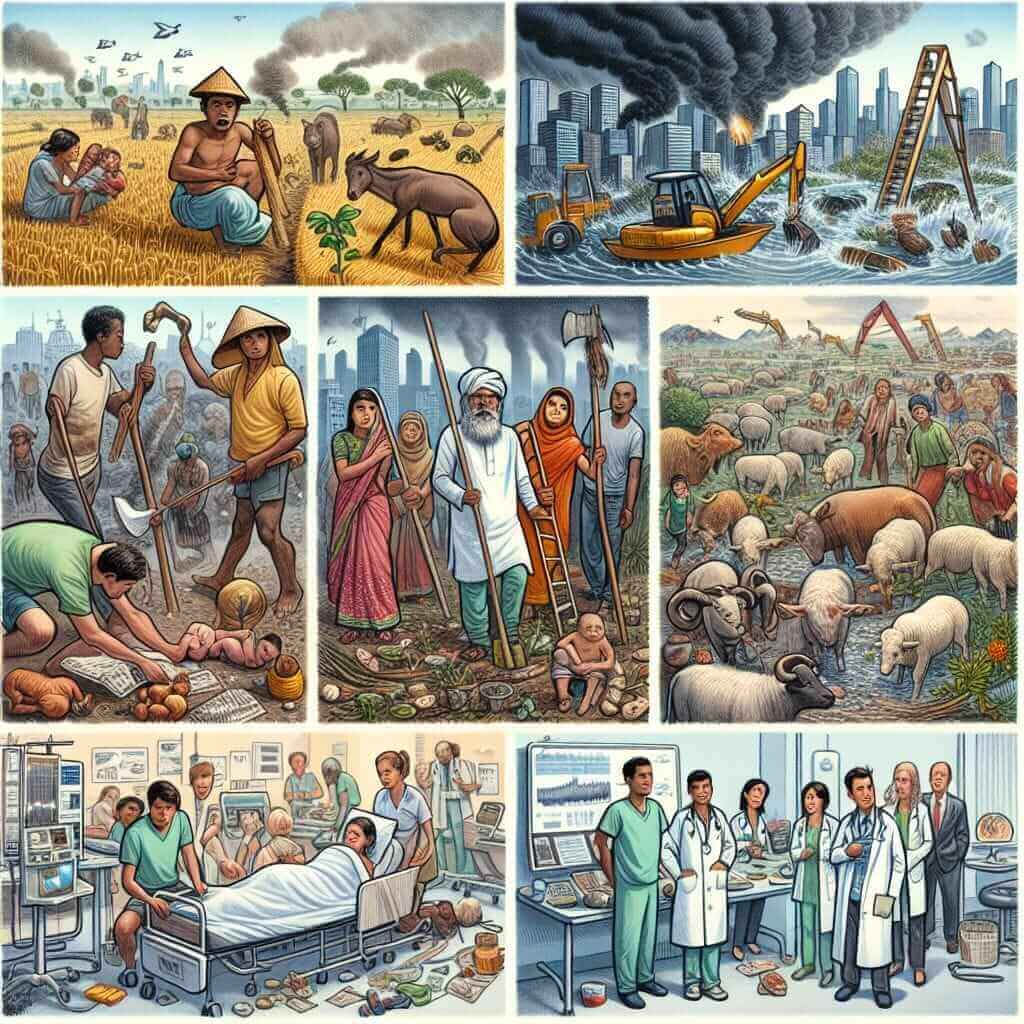The IELTS Reading section tests your ability to comprehend and analyze texts on various subjects. One key topic that often appears, given its global importance and multifaceted impact, is climate change. In particular, the question “How does climate change impact economic development?” is not only relevant but also frequently explored within IELTS Reading passages. This article will help you practice this type of content by providing a relevant sample reading passage, accompanying questions, detailed answers, vocabulary, and grammar tips.
Sample IELTS Reading Passage: How Climate Change Impacts Economic Development
Understanding the connection between climate change and economic development is crucial for policy-making and sustainable growth. This passage explores the dynamic and complex relationship between these two pressing global issues.
Passage
“Climate change has far-reaching impacts on economic development, affecting various facets like agriculture, infrastructure, and public health. A significant challenge is the increasing frequency and severity of extreme weather events, such as hurricanes, floods, and droughts. These events lead to substantial economic losses, particularly in developing countries that may lack robust infrastructure and financial resilience.
For instance, agriculture, which is a critical sector in many developing economies, is highly susceptible to climatic variations. Erratic rainfall patterns and prolonged droughts can devastate crop yields, leading to food insecurity and income loss for farmers. Similarly, changing temperatures and weather patterns can alter the distribution of pests and diseases, further straining agricultural productivity.
Infrastructure development is another aspect significantly impacted by climate change. The increased occurrence of extreme weather events can damage roads, bridges, and buildings, necessitating extensive repairs and reconstruction. This not only incurs direct costs but also disrupts economic activities and hinders growth.
Public health is also at risk due to climate change. Rising temperatures can exacerbate the spread of vector-borne diseases such as malaria and dengue fever. The increased incidence of heatwaves poses direct risks to human health, particularly for vulnerable populations such as the elderly and those with pre-existing health conditions. This health burden can translate into economic costs, affecting labor productivity and increasing healthcare expenditures.
Mitigation and adaptation strategies are essential to minimize the economic impacts of climate change. Implementing sustainable agricultural practices, investing in resilient infrastructure, and enhancing healthcare systems are some measures that can help. Moreover, international cooperation and financial support are crucial for developing countries to effectively tackle these challenges.
In conclusion, climate change presents a significant threat to economic development. It is imperative that both developed and developing nations take coordinated actions to mitigate and adapt to these changes to ensure sustainable and inclusive economic growth.”
Questions
Multiple Choice
-
What is one of the main sectors affected by climate change in developing countries?
a. Technology
b. Agriculture
c. Education
d. Tourism -
Which of the following is NOT mentioned as an impact of extreme weather events on infrastructure?
a. Necessitating repairs
b. Increasing direct costs
c. Improving economic activities
d. Disrupting economic growth
Identifying Information (True/False/Not Given)
- True/False/Not Given: Developed countries are more susceptible to economic losses from climate change than developing countries.
- True/False/Not Given: Public health issues related to climate change have no economic impact.
Identifying Writer’s Views/Claims (Yes/No/Not Given)
- Yes/No/Not Given: The writer believes that sustainable agricultural practices can help mitigate the economic impacts of climate change.
Short-answer Questions
- List two measures mentioned in the passage that can help minimize the economic impacts of climate change.
- How can rising temperatures affect public health?
Answers
- b. Agriculture – Agriculture is highlighted as a critical sector affected by climate change due to its susceptibility to climatic variations.
- c. Improving economic activities – The passage states that extreme weather events can disrupt economic activities, not improve them.
- Not Given – The passage does not compare the susceptibility of developed and developing countries to economic losses from climate change.
- False – The passage discusses how health risks from climate change can lead to economic costs by affecting labor productivity and increasing healthcare expenditures.
- Yes – The writer explicitly mentions that sustainable agricultural practices can help mitigate the economic impacts of climate change.
- Implementing sustainable agricultural practices, investing in resilient infrastructure – These are two measures provided in the passage to minimize economic impacts.
- Rising temperatures can exacerbate the spread of vector-borne diseases and increase the incidence of heatwaves, posing health risks, particularly for vulnerable populations.
Common Mistakes
- Overlooking Details: Candidates often miss specific details, leading to incorrect answers. Pay attention to keywords like ‘particularly’, ‘susceptible’, and ‘significant’.
- Misinterpreting Information: Ensure you understand the context of statements. For example, noting that infrastructure damage disrupts rather than promotes economic activities.
- Generalizing Facts: Avoid assuming information not explicitly mentioned in the text. Stick closely to what is stated.
Vocabulary
- Far-reaching (adj.) | /ˌfɑːrˈriː.tʃɪŋ/ |: having a wide range of influence or impact.
- Erratic (adj.) | /ɪˈræt.ɪk/ |: not regular or consistent.
- Mitigation (n.) | /ˌmɪt.ɪˈɡeɪ.ʃən/ |: the action of reducing the severity, seriousness, or painfulness of something.
- Resilience (n.) | /rɪˈzɪl.jəns/ |: the capacity to recover quickly from difficulties.
Grammar Focus
- Relative Clauses: Use to add essential information to a sentence, e.g., “Agriculture, which is a critical sector…”
- Present Simple for Timeless Truths: Used to state general facts, e.g., “Climate change has far-reaching impacts…”
Advice for High Scores in IELTS Reading
- Practice Regularly: Consistent practice with diverse topics improves comprehension and speed.
- Enhance Vocabulary: Note down new words and their meanings to build a robust vocabulary.
- Understand Question Types: Familiarize yourself with different question formats to tackle them effectively.
- Take Notes: Highlight or underline key information in passages to find answers quickly.

By preparing thoroughly and focusing on understanding the nuances of passages, you can excel in the IELTS Reading section. Happy studying!